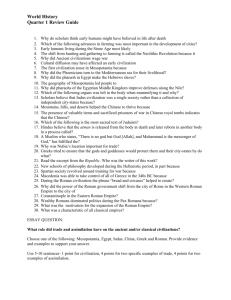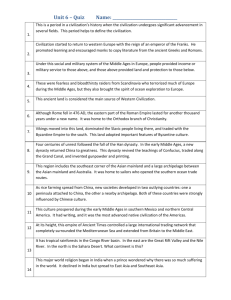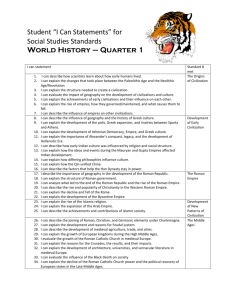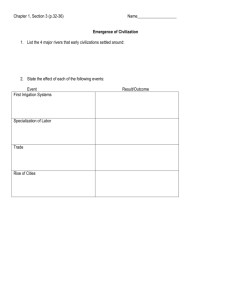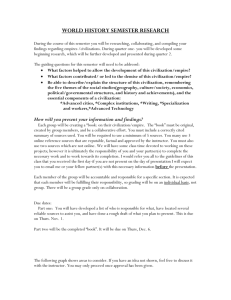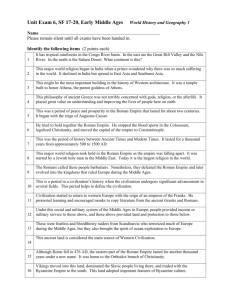HIST 1151 - Intro to Western Civilization I (TAG OHS042)
advertisement
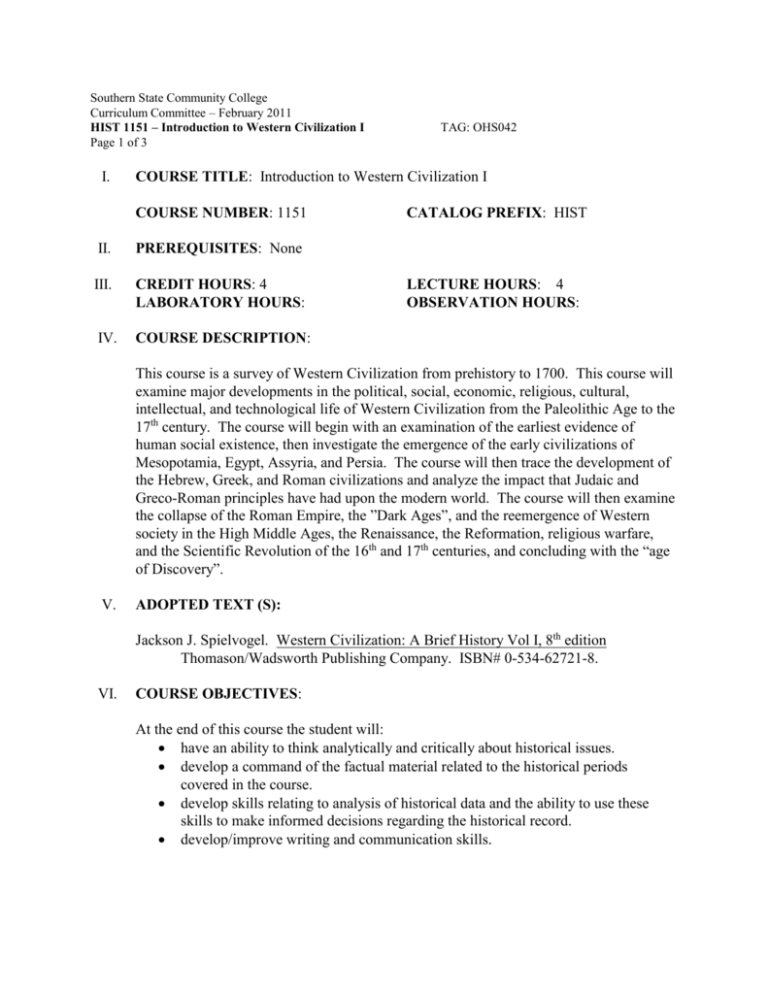
Southern State Community College Curriculum Committee – February 2011 HIST 1151 – Introduction to Western Civilization I Page 1 of 3 I. TAG: OHS042 COURSE TITLE: Introduction to Western Civilization I COURSE NUMBER: 1151 II. PREREQUISITES: None III. CREDIT HOURS: 4 LABORATORY HOURS: IV. COURSE DESCRIPTION: CATALOG PREFIX: HIST LECTURE HOURS: 4 OBSERVATION HOURS: This course is a survey of Western Civilization from prehistory to 1700. This course will examine major developments in the political, social, economic, religious, cultural, intellectual, and technological life of Western Civilization from the Paleolithic Age to the 17th century. The course will begin with an examination of the earliest evidence of human social existence, then investigate the emergence of the early civilizations of Mesopotamia, Egypt, Assyria, and Persia. The course will then trace the development of the Hebrew, Greek, and Roman civilizations and analyze the impact that Judaic and Greco-Roman principles have had upon the modern world. The course will then examine the collapse of the Roman Empire, the ”Dark Ages”, and the reemergence of Western society in the High Middle Ages, the Renaissance, the Reformation, religious warfare, and the Scientific Revolution of the 16th and 17th centuries, and concluding with the “age of Discovery”. V. ADOPTED TEXT (S): Jackson J. Spielvogel. Western Civilization: A Brief History Vol I, 8th edition Thomason/Wadsworth Publishing Company. ISBN# 0-534-62721-8. VI. COURSE OBJECTIVES: At the end of this course the student will: have an ability to think analytically and critically about historical issues. develop a command of the factual material related to the historical periods covered in the course. develop skills relating to analysis of historical data and the ability to use these skills to make informed decisions regarding the historical record. develop/improve writing and communication skills. HIST 1151 – Introduction to Western Civilization I Page 2 of 3 VII. COURSE METHODOLOGY: The primary format of the course will be lecture. Instructors may use videos, DVDs, and other materials at their discretion to supplement the lecture format. VIII. GRADING: Grading will follow policy in the catalog. IX. COURSE OUTLINE: The following historical periods will be covered: Week 1 Neolithic & Paleolithic Society Week 2 Early Mesopotamia Week 3 Early Egypt and the Near East: Nile Civilization, Hebrews, Assyrians, Persians Exam #1 Week 4 Early Greek Civilization: Minoan to Emergence of Macedonia Week 5 Hellenistic Period: Rise of Macedonia to Post Alexandrian Period Week 6 The Roman Republic Week 7 Early Roman Empire to 180 AD Week 8 Late Roman Empire 180 AD to the Fall of Roman Emergence of Christianity in the Roman World Exam #2 Week 9 Byzantine Empire and the Emergence of Islam Carolingian Empire Week 10 High Middle Ages: Land, Trade, City-Life, Intellectual Culture and Art, Emergence of European Kingdoms Week 11 Growing Power of the Church and the Crusades Late Middle Ages HIST 1151 – Introduction to Western Civilization I Page 3 of 3 X. Week 12 The Renaissance Exam #3 Week 13 The Reformation and Religious Warfare Week 14 Age of Discovery, Impact of European Expansion in the New World Week 15 17th Century Europe, Absolutism and European Culture Week 16 Exam #4 OTHER REQUIRED BOOKS, SOFTWARE AND MATERIALS: At least one supplementary text will be assigned at the discretion of the instructor. Texts may include historical monographs, biographies, primary source texts etc., that amplify issues or events of the era to be studied. XI. EVALUATION: XII. There will be one final examination Students are required to write a research paper Instructors will assign quizzes, examinations, projects, worksheets and other papers at their own discretion. SPECIFIC MANAGEMENT REQUIREMENTS: All out of class papers and research papers must be typed. The students are periodically informed of their progress. XIII. OTHER INFORMATION: FERPA: Students need to understand that your work may be seen by others. Others may see your work when being distributed, during group project work, or if it is chosen for demonstration purposes. Students also need to know that there is a strong possibility that your work may be submitted to other entities for the purpose of plagiarism checks. DISABILITIES: Students with disabilities may contact the Disabilities Service Office, Central Campus, at 800-628-7722 or 937-393-3431.
